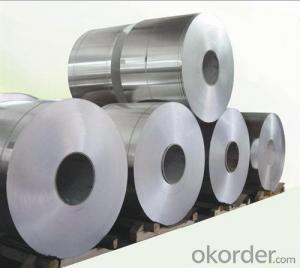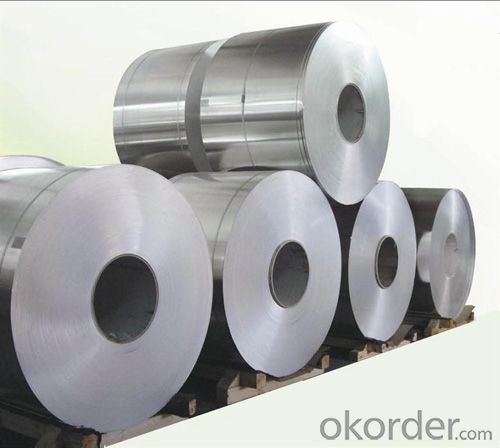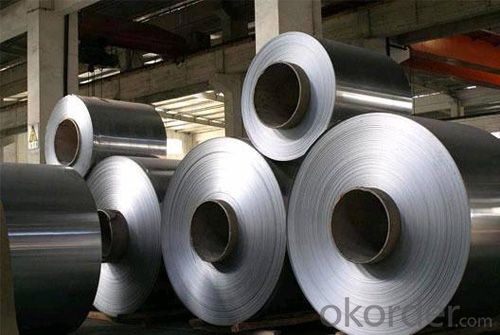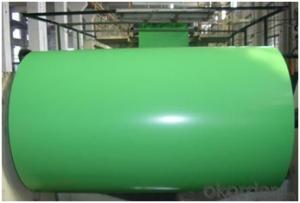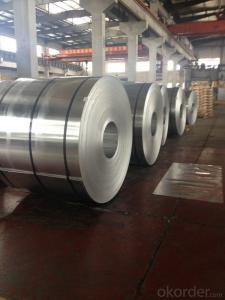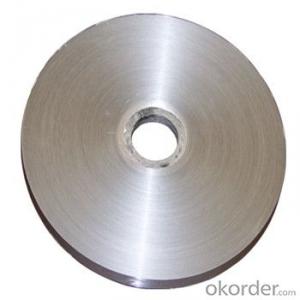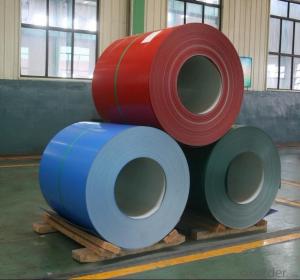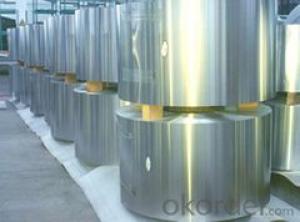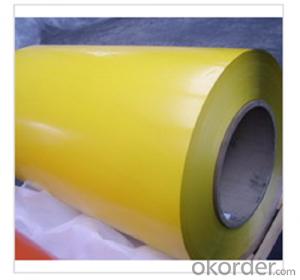Painting Aluminum Coil Stock for Industrial Applications
- Loading Port:
- China main port
- Payment Terms:
- TT OR LC
- Min Order Qty:
- 5 m.t.
- Supply Capability:
- 10000 m.t./month
OKorder Service Pledge
OKorder Financial Service
You Might Also Like
Specification
1. Specification of Aluminium Coils for Industrial Applications
Alloy: 1050, 1060, 1100, 1200, 3003, 3004, 3105, 1235, 8011, 8079, 8006, 5005, 5052, 5754, 5083,etc
2) Temper: Free
3) Thickness: ≥3mm
4) Width: 900-2300mm
5) Weight: 7-8 tons per coil
6) Dimensions and weight can be produced according to clients' specifications.
7) Inner Diameter: 505mm, 605mm
8) Packing: Export standard, wooden pallet.
9) Delivery time: 10-20 days
10) Minimum order quantity:20 tons per size.
11) The term of payment: T/T, irrevocable L/C at sight.
12) Surface: Bright
13)Origin: China
2. Feature of Aluminium Coils for Industrial Applications
*Such coil is specially designed to replace aluminum ingot, due to the high export tax of aluminum ingot, the coil has better price than ingot.
*This type of coil can fit customer's remelting furnace just like ingot, no need to make any change to the production line that was previously used for ingot. The standard coil size and weight is very suitable for the feed gate of furnace.
*This type of coil causes less material wastage than ingot when remelted.
*Our coil is made directly from ore, no need to go though the ingot making process, quality is much better than other suppliers who use ingot scrap to make coil.
Be free from Oil Stain, Dent, Inclusion, Scratches, Stain, Oxide Dicoloration, Breaks, Corrosion, Roll Marks, Dirt Streaks and other defect which will interfere with use
3. Certificate:
SGS and ROHS(if client request, paid by client), MTC(plant provided), Certificate of Origin(FORM A, FORM E, CO), Bureau Veritas and SGS (if client request, paid by client), CIQS certificate
4. Image of Aluminium Coils for Industrial Applications
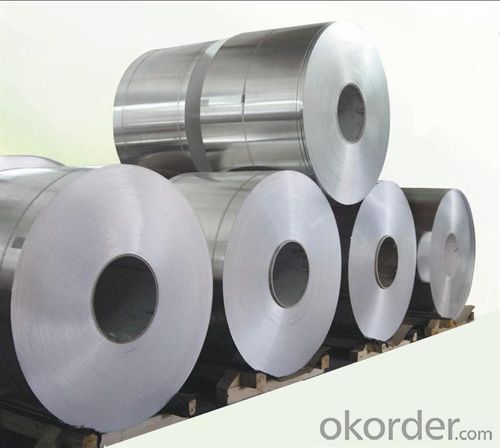
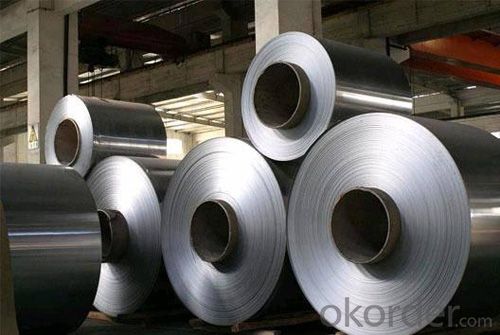
6. Package and shipping of Aluminium Coils for Industrial Applications
eye to sky
eye to wall
with wooden pallet (wooden case also available)
7. FAQ
1) What is the delivery time?
Dpends on actual order, around 20 days
2) What is the QC system:
We have QC staff of 20 persons and advanced equipment, each production is with MTC traced from Aluminum ingot lot.
3) What market do you mainly sell to?
Australia, America, Asia, Middle East, Western Europe, Africa etc
- Q: What are the different coil diameters available for aluminum coils?
- The different coil diameters available for aluminum coils can vary depending on the manufacturer and specific application. However, common coil diameters for aluminum coils range from as small as 1 inch to as large as 60 inches or more.
- Q: What are the common sizes of aluminum coils?
- Common sizes of aluminum coils vary depending on the specific industry and application. However, some standard sizes are commonly used across different industries. For the construction industry, common sizes of aluminum coils range from 0.018 inches to 0.032 inches in thickness and can have widths from 12 inches to 60 inches. These coils are typically used for roofing, siding, and gutter applications. In the automotive industry, aluminum coils are often used for manufacturing various parts, such as body panels and structural components. The sizes of these coils can vary greatly, ranging from thin strips for small parts to larger coils with widths of up to 72 inches for larger components. For the packaging industry, aluminum coils are used to produce foil products, such as food packaging and industrial packaging. The thickness of these coils can range from 0.00017 inches to 0.0005 inches, while the widths commonly range from 12 inches to 24 inches. It's important to note that these are just some of the common sizes, and specific applications may require custom sizes of aluminum coils. Additionally, manufacturers often have the capability to produce coils in various sizes to meet the specific needs of their customers.
- Q: I have a muffin pan made of aluminum foil and I do not know if i can put it in the oven to cook some muffins. Many sights say it will melt but they say that about putting a sheet of foil at the bottom of the oven for a long time. I just want it to be in their for half an hour to make muffins.
- Tell me. Why would they make a muffin pan (disposbale) that Cannot go into the oven? Think about this. Those are all disposbale Bake Ware. The pan will not melt but it is not very sturdy and putting a sheet tray under it will help preent spills. You can also put aluminion foil from the roll in the oven.
- Q: The temperature of the water drops from 93.0°C to 78.0°C. What quantity of heat energy did the piece of aluminum absorb?
- The specific heat of Aluminum is 0.215 cal/g-°C. The calories absorbed (q) would be q = m * c * (T2 -T1) = 22.0 g * 0.215 cal/g-°C * (78.0 °C - 0.3 °C) If you have a different value for the Specific heat of Aluminum, use it in the formula for your calculations. If you knew the mass of the water, you could check your calculations because the heat gained by the Al would be equal to the heat lost by the water, using q = m * c * (T2 -T1), where m is the mass of the water, c = 1.00 calorie/gram °C, T2 = 78.0 °C and T1 = 93.0 °C. The sign of q will be negative.
- Q: Can aluminum coils be used for automotive heat shields?
- Yes, aluminum coils can be used for automotive heat shields. Aluminum is a lightweight and durable material that has excellent heat resistance properties, making it suitable for use in automotive heat shields. Its ability to dissipate heat efficiently helps protect sensitive components from excessive heat, ensuring optimal performance and durability in vehicles.
- Q: What are the common transportation methods for aluminum coils?
- Aluminum coils can be transported using various methods such as trucking, rail, and shipping. When prompt delivery or short distances are involved, trucking is commonly employed. To ensure secure transit, aluminum coils are loaded onto specialized trailers equipped with cradles or coil racks. This approach provides flexibility and easy access to different locations. For long-distance shipments, rail transportation is frequently utilized. Railcars specifically designed to accommodate the weight and dimensions of aluminum coils are used for loading. This transportation method is advantageous due to its cost-effectiveness and ability to transport large quantities of coils in a single shipment. When it comes to international shipments, shipping by sea is a popular choice. Aluminum coils can be loaded onto cargo ships either in specialized containers or directly on the ship's deck. Shipping offers the benefit of transporting large volumes of coils over long distances and is often preferred for global distribution due to its efficiency and cost-effectiveness. Ultimately, the choice of transportation method for aluminum coils depends on factors such as distance, urgency, quantity, and destination. Companies must carefully consider these factors in order to determine the most suitable transportation method for their specific needs.
- Q: How do aluminum coils withstand extreme weather conditions?
- Due to the unique properties of aluminum, aluminum coils can endure harsh weather conditions. Firstly, aluminum's lightweight nature allows it to remain flexible and resistant to bending or warping when faced with strong winds or heavy snow loads. As a result, aluminum coils are less likely to be damaged during extreme weather events like hurricanes or blizzards. Moreover, aluminum possesses a high resistance to corrosion. When exposed to air, it forms a protective oxide layer on its surface, preventing rusting or deterioration caused by moisture or severe weather conditions. This protective layer acts as a barrier against elements such as rain, snow, or saltwater, making aluminum coils highly durable and long-lasting. Additionally, aluminum exhibits high thermal conductivity, enabling it to efficiently dissipate heat. This property ensures that aluminum coils effectively transfer heat away from the system, preventing overheating and potential damage during hot weather conditions. Furthermore, the efficient dissipation of heat contributes to the energy efficiency of aluminum coils. Lastly, aluminum is a non-magnetic material, rendering it unaffected by electromagnetic interference or lightning strikes. This quality makes aluminum coils safe and dependable in areas prone to electrical storms or high levels of electromagnetic activity. To summarize, aluminum coils are designed to endure extreme weather conditions due to their lightweight, corrosion-resistant, thermally conductive, and non-magnetic properties. These characteristics make aluminum coils highly durable, dependable, and suitable for various applications, including HVAC systems, automotive cooling, and electrical wiring.
- Q: What are the maintenance requirements for aluminum coils?
- The maintenance requirements for aluminum coils typically involve regular cleaning to remove dirt and debris, inspection for any signs of corrosion or damage, and ensuring proper airflow around the coils to prevent overheating. Additionally, periodic lubrication of moving parts and regular filter replacement are recommended to maintain optimal performance and efficiency.
- Q: What are the rules and guidelines that govern the transport of aluminum coils?
- <p>Yes, there are specific regulations for the transportation of aluminum coils. These include adhering to weight limits, ensuring proper packaging to prevent damage, and following guidelines for secure loading and unloading. Compliance with hazardous materials regulations is also crucial if the coils are being transported internationally. It's important to check with the specific transportation authority or consult the International Air Transport Association (IATA) and International Maritime Dangerous Goods (IMDG) codes for detailed guidelines.</p>
- Q: what is the most likely charge for aluminum cation?the answer is +3, but why? how can i figure this out with different ones?
- Aluminum has 3 valence electrons and it will try to get rid of these to end up with the outer valence shell being full. Electrons have a negative charge though, so getting rid of one brings the actual charge up, so it ends up +3.
Send your message to us
Painting Aluminum Coil Stock for Industrial Applications
- Loading Port:
- China main port
- Payment Terms:
- TT OR LC
- Min Order Qty:
- 5 m.t.
- Supply Capability:
- 10000 m.t./month
OKorder Service Pledge
OKorder Financial Service
Similar products
Hot products
Hot Searches
Related keywords
